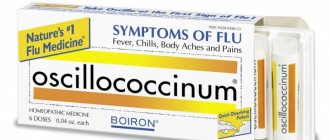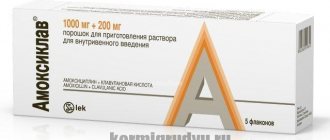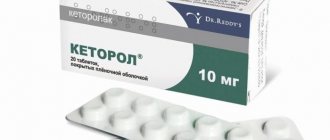Often a young mother experiences fever during lactation. What antipyretic drugs are indicated for mothers during breastfeeding? Below are tips and recommendations from leading pediatricians, therapists and gw consultants.
Fever during breastfeeding does not require weaning the baby from the breast; it is enough to choose the right and safe antipyretic drug for a nursing mother.
Medicines to reduce fever
The mother's immune system weakens during breastfeeding, and the risk of infectious and viral diseases increases. Also, after childbirth, complications may arise due to inflammation of scars, organs of the genitourinary system, stagnation of milk, and other things. One of the symptoms that accompanies such diseases is an increase in body temperature. Despite the different reasons, readings of 38.5 degrees and above are reduced by antipyretic drugs.
Paracetamol
This non-steroidal anti-inflammatory drug simultaneously has anti-inflammatory, antipyretic, and analgesic effects. When consumed, it does not irritate the intestinal mucosa. When penetrating into milk (up to 25%), it does not have a dangerous effect on the infant.
The permissible dose at one time is 500 mg, the next tablet or capsule can be taken after 6 hours. The maximum norm per day is 4 g. The duration of the course is up to 7 days, after which the risk of impaired kidney and liver function increases.
Paracetamol analogs include Panadol, Rapidol, Milistan, which contain a similar active ingredient. The difference lies in the addition of excipients, the speed of the drug’s effect on the body, and the pricing policy.
Before taking an antipyretic drug, you should definitely consult a doctor in order to avoid allergic reactions and the dangerous effect of the drug on the child’s body.
Ibuprofen
Ibuprofen acts on the body when the temperature rises like paracetamol - it relieves inflammation, reduces temperature, relieves pain, and eliminates body aches.
The drug is available in tablets of 200 and 400 mg. The course of treatment ranges from 1 to 3 weeks. Up to 4 tablets of 200 mg are allowed per day. When increasing the dosage, it is necessary to stop lactation.
An overdose of the drug may cause side effects such as dizziness, nausea, diarrhea, sleep disturbances, skin rash, and Quincke's edema.
In pharmacies you can find analogs of Ibuprofen based on the active substance:
- Ibufen – suspension for oral administration;
- Ibuprom – tablets of 200 and 400 mg;
- Nurofen - fast-acting tablets. It is important to remember that the drug in the form of syrup with various flavoring additives is prohibited during lactation.
It is recommended to take the medicine after feeding the baby, then by the next stage of the child's meal the maximum concentration of the medicine will decrease.
Rectal suppositories
When breastfeeding, pediatricians advise lowering the temperature with the help of suppositories that do not cause stomach irritation, are comfortable to use, and the active substance does not penetrate into mother's milk.
Antipyretic suppositories have a long-lasting effect (from 4 to 6 hours) compared to tablets. The safe period of use is limited to three days.
What tools can be used:
- Paracetamol;
- Cefekon;
- Ibuprofen;
- Nurofen.
The drug should be administered after bowel movement.
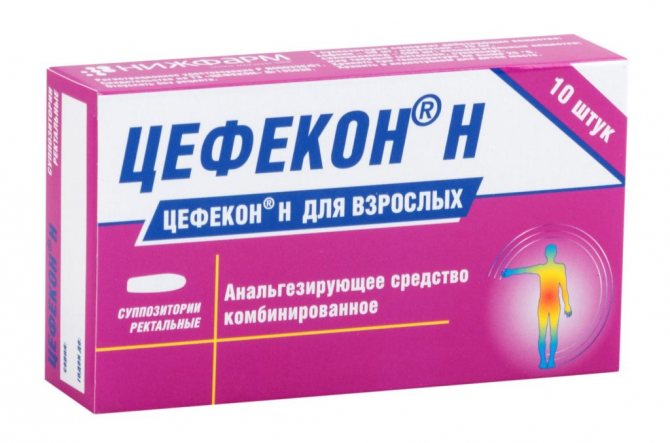
When using suppositories, you must read the instructions in the package and consult your doctor.
Principles of treatment
It is necessary to begin treatment for a cold as early as possible, at the first signs, and it is advisable to carry out treatment strictly under the supervision of a doctor.
Breastfeeding does not stop during colds, but the baby must be fed, following all the rules for preventing colds in the baby.
It is advisable not to use such widely used anti-viral drugs as arbidol, rimantadine or ribovirin for mild ARVI, since they are not very effective if they are not used from the first hours of a cold and can cause significant harm to the child’s body.
The drugs can cause digestive disorders in the baby, abdominal pain and loose stools, and can lead to increased nervous excitability, as well as allergies.
You should use drugs like aflubin or immunal with caution; they can also cause allergic reactions.
To prevent ARVI or for treatment, you can use drugs such as influenza (instillation of drops into the nose), Viferon suppositories, which have no contraindications or side effects.
For viral infections, the use of antibiotics is not indicated, since they do not have an application point (antibiotics do not affect viruses).
But in case of complications, the development of a bacterial infection, antibiotics compatible with breastfeeding can be prescribed as prescribed by a doctor. They are prescribed in the shortest possible course.
Most of today's widely used antibiotics used on an outpatient basis are compatible with hepatitis B. The use of drugs such as gentamicin, doxycycline, sulfonamides, and tetracyclines is prohibited for hepatitis B.
What drugs are not recommended during lactation?
To reduce the temperature during hepatitis B, you need to use only proven safe antipyretics.
Aspirin
Aspirin should be used during lactation with great caution and only if there is no safe alternative. If acetylsalicylic acid is regularly introduced into a child's body, it can cause damage to the liver and brain.
If the child is also sick when the mother’s temperature rises (ARVI, etc.), then Aspirin can worsen the baby’s condition. Additionally, the risk of bronchial asthma, damage to the intestinal mucosa, diathesis, and decreased blood clotting increases.
Powders and teas for colds
It is not recommended to use advertised powders during lactation - Fervex, Mefenominka, Coldrex. The instructions indicate that taking such drugs during lactation is prohibited. A one-time is allowed if safe drugs are not available.
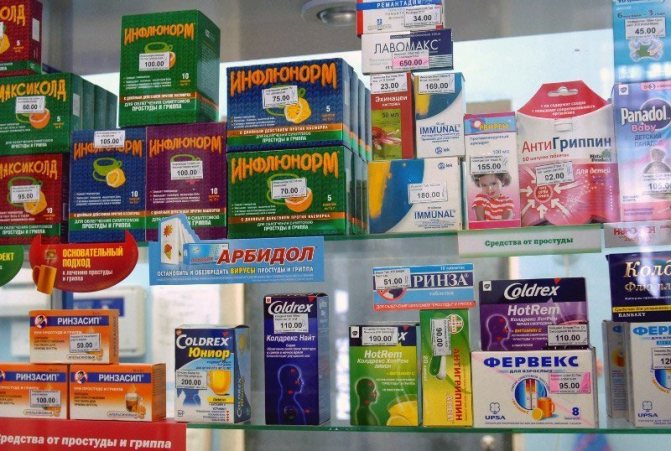
The use of soluble powders against flu and colds is not recommended for nursing mothers; they should be used only in case of emergency and there are no other remedies at hand.
The composition of the above antipyretic medications has not been studied, there is a high probability of side effects in a child - rash, skin irritation, nausea, headaches, diarrhea, swelling of the throat.
A cold is an acute respiratory disease caused by various viruses entering the body. We have long stopped giving special importance to this disease. Probably, every adult has his own way and a set of medications that help him, without much difficulty, cope with this disease. But how to cure a cold if you are breastfeeding. It is highly undesirable to take many medications that you took in everyday life at the first cold symptoms, because they can harm your baby.
The symptoms of a cold are familiar to everyone - sneezing, runny nose, sore throat, weakness, lethargy and fever.
IS IT POSSIBLE TO BREASTFEED A CHILD IF THE MOTHER HAS A COLD?
A breastfed baby, along with mother's milk, receives powerful protection from various types of colds, therefore, there is no need to stop breastfeeding if you have a cold. A reason for temporarily stopping breastfeeding during a cold may be taking medications. In this case, it is necessary to temporarily transfer the child to artificial feeding. To ensure that milk production does not stop, it must be expressed regularly.
WHAT MEDICINES CAN BE TREATED FOR COLDS WHILE BREASTFEEDING?
It would be a good idea for a sick mother to wear a mask, which needs to be changed every two hours. When breastfeeding, all advice for treating a cold boils down to the fact that you need to drink more. When using folk remedies, be careful - raspberries, honey and lemon, known to everyone as an excellent cure for colds, are also very strong allergens. It is worth remembering that the use of antibiotics to treat a viral infection is pointless. Therefore, the meaning of treatment comes down to reducing intoxication and increasing immunity. Prescribing antibiotics may be justified if the doctor discovers a bacterial complication, this could be a sore throat or pneumonia.
At the first symptoms of a cold, Grippferon helps well; it has no contraindications, and its use is possible during breastfeeding. Viferon suppositories have a good effect in treating colds; they can also be used during breastfeeding.
“Coldrex”, “Fervex” and “Teraflu” - it is not advisable to use these drugs to treat colds while breastfeeding. And if possible, it is better for a nursing mother to refrain from using them.
At a temperature
If the temperature has risen above 38.5 degrees, you can bring it down by drinking a paracetamol tablet. Paracetamol is safest for use by a nursing mother. There is no need to bring down a temperature that has not reached this level using antipyretics. In this situation, the best option is to drink plenty of fluids and wipe the body with a weak solution of vinegar.
For sore throat
For sore throat, it is possible to use topical medications - Hexoral, Iodinol, Strepsils.
When coughing
For coughs, medications containing Bromhexine are contraindicated for nursing mothers. They can be perfectly replaced with herbal preparations. These include: “Breast Elixir”, “Gedelix”, “Tussamag”.
With a runny nose
For a runny nose, drops of plant origin, such as Pinosol, are best suited. And to moisturize the nasal mucosa, sprays based on sea water are recommended, these include: “Aquamaris” and “Salin”.
Procedure for temperature
To improve the mother’s condition and not harm the baby, it is important to find out the cause of the high temperature. During feeding, the nursing mother’s body temperature rises to 37.2, which is not dangerous and is normal.
It is recommended to measure the temperature in the elbow to accurately record the readings. You can use your armpit, but only after feeding, wiping the cavity dry with a towel.
It is necessary to take measures to reduce the temperature when the readings exceed 38.5 degrees. If the value is below this mark, you should not take medications, because the body independently fights pathogenic bacteria.
Step-by-step actions at temperature:
- bed rest;
- drinking enough fluids - compotes, fruit drinks, teas - to avoid dehydration. Drink 150 ml of liquid every 30 minutes;
- take a safe antipyretic - Ibuprofen, Paracetamol;
- cover yourself with a warm blanket - sweat;
- cold compress on the forehead (gradually reduces fever);
- monitor the temperature (do not exceed 19-20 degrees) and humidity in the room;
- eat food as desired, do not overload the intestines. Consume vegetables, fruits, light soups, broths and cereals.
Komarovsky recommends wiping with vinegar (a weak solution) or cool boiled water. Pay special attention to the areas of the abdomen, groin, head, legs, arms. After the procedure, cover yourself with a sheet.
During a cold, tea with raspberry leaves or jam will be beneficial. This is a natural antipyretic that can replace pharmaceutical drugs. Add honey or lemon to the cup (after 3-4 months from the birth of the baby). A decoction of currant leaves, mint, and linden blossom is also useful. Drink in small portions, as the fees increase lactation.
A useful remedy for colds after the fever has been eliminated is mustard foot baths. Carry out the event before going to bed, be sure to put on woolen socks and wrap your feet in a blanket afterwards. It is recommended to drink a cup of warm tea with honey and dried fruits (if the baby is not allergic to the product).
If you refuse to feed your baby during illness, it is important to express in order to maintain lactation.
Coldrex Hotrem
This medicine is in the form of a powder substance, packaged in disposable bags (5 g each) for making tea. There are 50 sachets in a cardboard box. There are 2 flavor variations: lemon and lemon with honey. They are used to reduce fever, relieve swelling in the nasal cavity, and eliminate headaches, joint and muscle pain.
Main substances: paracetamol, phenylephrine, vitamin C. Additional substances: citric acid, food additive E331, sodium saccharinate, aromatic additive “Lemon”.
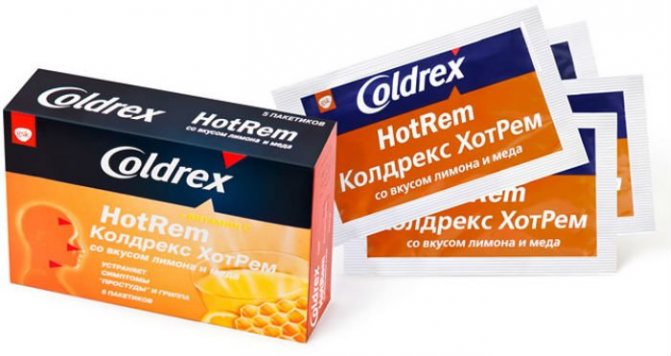
Used as part of complex therapy for the treatment of influenza and acute respiratory diseases. To prepare the drink, dilute the contents of the package in warm water (200 ml). Dosage for adults – 1 sachet for 5 hours, for children over 13 years old – 1 sachet every 7 hours, about 3 sachets per 24 hours.
The drug has a whole list of contraindications:
- hypersensitivity;
- functional failure of the kidneys and liver;
- intoxication with thyroid hormones;
- diabetes;
- disturbances in the functioning of the heart;
- arterial hypertension;
- benign prostatic hyperplasia;
- glaucoma;
- children under 13 years of age.
The medication should not be taken together with monoamine oxidase inhibitors, tricyclic psychotropic drugs, beta-blockers, or with an interval of less than 14 days.

Coldrex Hotrem can be taken during lactation after a doctor's prescription, however, this should be done with caution. The concentration of paracetamol in the composition is small (750 mg), but due to phenylephrine, the mother’s blood pressure increases and the functioning of the gastrointestinal tract is disrupted.
In case of an overdose, vomiting occurs, the skin turns pale, and an allergic reaction is possible. The component has a negative effect on the liver.
Should I stop feeding if I have a fever?
An increase in body temperature during lactation indicates the occurrence of an inflammatory process in the mother's body. If such symptoms appear, it is important not to self-medicate, but to visit a doctor to establish a diagnosis.
Nothing happens to mother's milk at high temperatures. Milk is formed from blood and lymph, where viruses do not penetrate. It is important to continue feeding as normal to avoid lactostasis. This is one of the safest ways to “transport” protective antibodies into the child’s body.
Fever during breastfeeding is not an indication for weaning a child. It is important to simply use safe antipyretic drugs to get rid of the disease and not harm the baby.
How to treat
Surely, each person has his own standard set of medications that help overcome the first signs of a viral infection quickly and effectively. The most popular remedy for relieving flu and cold symptoms is Coldrex. At any other time, a nursing mother would immediately take the prescribed dose of medicine, and this would help her get back on her feet faster. But the fact that the mother is now breastfeeding her baby stops her from taking the usual, effective remedy.
It is necessary to figure out whether Coldrex can be taken while breastfeeding, and what the consequences of independent use of this drug may be. It is necessary to immediately clarify that Coldrex is available in various variations - in the form of tablets and instant powders. And permission to take one of the forms of this drug during breastfeeding can only be given by a doctor, having assessed the general condition of the nursing mother, as well as the need to prescribe this particular drug, taking into account the potential risks and benefits for the woman’s health.
It is important to consider all forms of the drug Coldrex intended for use by adults and figure out whether they can be taken while breastfeeding.
This version of the drug is available in powder form, which is dissolved in a glass of hot water and taken orally, no more than once every 5 hours.
The powder is packaged in 5 gram sachets, a cardboard box contains 50 sachets. The medicine Coldrex Hotrem is available in powders in two flavors - lemon and lemon with honey.
The active ingredients are paracetamol, phenylephrine and vitamin C.
A hot drink effectively fights the symptoms of a cold - nasal congestion, headache, malaise and fever.
You can take this medicine while breastfeeding, but with great caution and only after the permission of your doctor. The amount of paracetamol included in the drug is small - about 750 mg, but the presence of phenylephrine can cause an increase in blood pressure and disruption of the gastrointestinal tract in a nursing mother.
Available in 4, 6, 8 or 12 tablets in a blister; the package may contain 1 or 2 blisters.
Active ingredients of the tablets: paracetamol, guaranine, terpene hydrate, phenylephrine, ascorbic acid.
Indications for the use of this form of the drug are joint and muscle pain, fever, runny nose and sore throat.
Taking Coldrex tablets during breastfeeding, as well as powder, is possible only after a doctor’s permission and an assessment of the possible risks. If the doctor considers it necessary to prescribe these tablets for the treatment of a cold, then you can take them, but subject to strict adherence to the calculated dosage of the drug.
Available in powder form for preparing a hot drink, the sachet contains 6.4 grams of the drug.
Active ingredients: paracetamol in an amount of 1 g, phenylephrine, vitamin C.
The high content of paracetamol in the drug provides it with a high level of effectiveness - in just a couple of minutes the patient feels relief, the temperature drops, and the headache and muscle pain disappear.
But the listed advantages are the main contraindication for taking Coldrex Max Flu - its use by nursing mothers is prohibited due to the high concentration of paracetamol in the powder.
Available in the form of syrup with a pronounced antitussive effect. Effectively thins mucus and promotes its removal from the bronchi.
Active ingredients of the syrup: guaifenesin, anise oil, red hot pepper extract, camphor.
The syrup is sold in glass bottles of 100 ml and 160 ml.
The drug is prescribed for inflammation of the bronchi, trachea, as well as for diseases that are accompanied by a large amount of sputum secreted.
Its use in nursing mothers is possible with the permission of a doctor. If the doctor considers that the benefits of taking this drug will be high enough, he may recommend stopping breastfeeding for a while while the mother drinks Coldrex Broncho syrup.
This form of the drug is intended to be taken at night. Available in the form of syrup, which contains diprazine, paracetamol, dextrometrophan.
Indications for the use of Coldrex Knight are severe muscle pain, aches, high fever, weakness, night cough, swelling of the nasal mucosa. Taking this medicine before bedtime has an analgesic, hypnotic effect, relieves a painful cough, and reduces fever.
When a therapist prescribes this form of medication to a nursing mother, she must strictly follow the dosage regimen prescribed by the doctor.
Available in tablet form, it is intended for the treatment of symptoms of ARVI and influenza.
Main components: paracetamol, phenylephrine, guaranine, terpene hydrate, ascorbic acid.
The medicine alleviates the general condition of the patient, eliminates weakness, malaise, reduces temperature, and relieves pain.
Just like other forms of Coldrex, these tablets can be taken by nursing mothers after being prescribed by a doctor. Self-administration of the medicine is prohibited, since the possible effect of the components of the drug, which can enter the baby’s body through breast milk, has not been fully studied.
Fervex during pregnancy: pharmacological properties of the drug
It is recommended for pregnant women to drink Fervex for colds to provide a number of therapeutic effects due to the activity of the active ingredients.
To reduce cold symptoms, taking the powder 1-2 times is enough. Paracetamol, a non-narcotic analgesic, exhibits analgesic and antipyretic properties. The component has the following pharmacological properties:
- takes part in blocking cyclooxygenase in the central nervous system;
- affects thermoregulation;
- exhibits analgesic properties.
Paracetamol is characterized by high absorption, the maximum concentration is observed half an hour to an hour after using the medicine. The substance penetrates the placental barrier and is excreted in breast milk. The doctor explains in detail about Paracetamol during pregnancy.
The antihistamine substance finiramine reduces mucous discharge from the nose, facilitates breathing, eliminates lacrimation and spasmodic phenomena, redness, and itching in the eyes. It is rapidly absorbed, with a half-life of up to 1.5 hours.
Vitamin C restores metabolic processes, normalizes vascular permeability, and improves the effectiveness of antipyretics. Ascorbic acid penetrates the placental barrier, platelets and leukocytes, and increases blood clotting. Accumulates in glandular organs and lenses of the eyes. Reaching the maximum concentration is observed 4 hours after taking the drug. Metabolic processes occur in the liver and are excreted through the intestines and kidneys.
Fervex: indications for use
Fervex is used in the treatment of patients with:
- ARVI;
- rhinopharyngitis;
- increased body temperature;
- headache;
- nasal congestion.
Many women turn to their doctor with the question: Is Fervex for pregnant women possible or not? If possible, specialists select safer means: elements of herbal medicine, homeopathy, lifestyle and diet correction. Non-steroidal anti-inflammatory drugs can negatively affect the condition of a pregnant woman and the processes of growth and development of the fetus. Therefore, such medications are used with extreme caution, in case of emergency.






